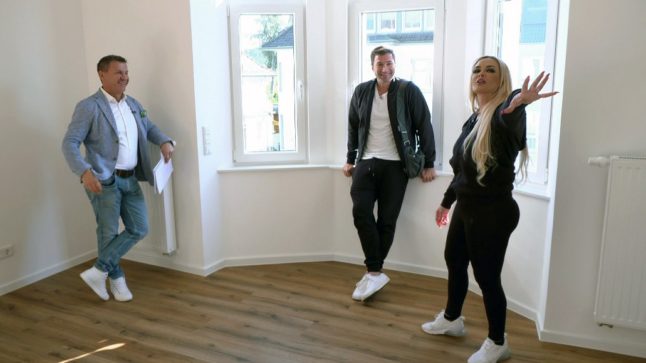On Wednesday, an alarming story started doing the rounds on social media. A post on Reddit shared screenshots that purported to show a shocking – and incredibly personal – email exchange between a Berlin landlord and prospective tenant.
In the first part of the exchange, the landlord replies to a request for an apartment viewing in the district of Schöneberg that was made through the flat-hunting website WG-Gesucht.
“You can book a viewing straight away by clicking on the following link,” it reads. “Please include your email address.”
So far, so normal.
But then things take a rather invasive turn.
“Please note that to rent the apartment, we require proof that no children will be moving in,” the email continues. “Moreover, you should provide proof that you are not currently pregnant.”
The landlord then goes on to provide the details of their “contracted” doctor, who can apparently carry out a pregnancy test, and helpfully adds that the evidence can be submitted online “free of charge”.
A symptom of the housing crisis?
Though the veracity of the post hasn’t yet been verified, it quickly caused an outbreak of shock and outrage online – especially among people who had experienced the Berlin housing market and found the exchange to be all too plausible.
“You thought your housing crisis was bad?,” freelance journalist James Jackson wrote on Twitter. “A landlord in Berlin is asking female applicants to go to a doctor to prove that they aren’t pregnant.”
Another commenter on Reddit suggested the would-be tenant had grounds for a “juicy discrimination lawsuit”, while others puzzled over the reasons for the invasive question.
READ ALSO: Why Germany is seeing the ‘worst housing shortage in 20 years’
Der ganz normale Irrsinn des Berliner Mietmarkts 🙃
„Zudem muss nachgewiesen werden, dass keine Schwangerschaft besteht. Kontaktieren Sie hierzu bitte die von uns beauftragte Ärztin […]“ pic.twitter.com/2LwXEBmvf9
— Ssaman Mardi (@SsamanMardi) April 12, 2023
“I can’t imagine why a landlord would have such a strong interest in excluding pregnant women,” one Reddit user wrote. “Sure, children can wear out a flat a bit more than adults, but the tenant is ultimately responsible for the damage. Children can be noisy and annoy the neighbours, but unless the landlord lives next door himself, he could care less. It’s not as if the other flats in the building are unrentable.”
Whether it’s true or not, the incident adds to the ever-growing pile of reports of seemingly unlawful or bullying behaviour on the part of landlords. Every week, there are tales of people being strong-armed into rapidly signing a contract, landlords demanding twice the market rent, withholding deposits for dubious reasons or attaching strange terms and conditions to a tenancy.
READ ALSO: OPINION: Germany’s ruthless housing market is tough on new tenants – but there are winners
At the end of the alleged email exchange on Reddit, the landlord in question appears to sarcastically invite the applicant to go to a lawyer and “take legal steps” against them. “We have 100% nothing to fear,” they write.
“At the same time, you hereby receive a rejection for the flat,” the email continues. “Reason: unlawful accusation. Inappropriate behaviour towards the landlords, which does not allow for a tenancy based on trust.”
But is this kind of thing actually legal?
Though the landlord seemed to think they’d done nothing wrong, there are big question marks over whether the exchange would indeed be legal as far as German tenancy law is concerned.
According to the Landlords’ Association, the case law states that the landlord’s interest in obtaining information about a prospective tenant has to be weighed against the tenant’s interest in protecting their personal data.
“Therefore, the landlord only has the right to ask questions to the extent that he has a justified, reasonable and protectable interest in answering his question,” the association explains. “In this context, the question about pregnancy is considered inadmissible.”
In short: the landlord has no right to ask for that type of information and the tenant is not obliged to provide information on a pregnancy before moving into the flat.
READ ALSO: EXPLAINED: The hidden costs of renting in Germany

The Landlords’ Association goes on to add that the landlord cannot prohibit the admission of offspring into the flat either by a formal clause or by individual contractual regulations.
“Celibacy and childlessness clauses are invalid under section 138(1) of the Civil Code (BGB),” it adds.
Even after a tenancy is taken up, rental law seems to remain on the side of the tenant here: they neither need to inform their landlord that they’re pregnant nor ask for permission to use the flat once the baby arrives. That’s because close family members such as offspring or your spouse aren’t considered “third parties” under German tenancy law, so a renter doesn’t have any obligation to request a change in their contract to allow their own child to move in.
However, it is generally considered necessary for people to inform their landlord after the birth of the child – even if the landlord can’t object to them living there.
READ ALSO: The words you need to know before renting a flat in Germany
Are there any exceptions to the law?
One potential objection a landlord could have to children sharing the flat would be overcrowding.
However, the conditions for this are generally quite vague and wouldn’t prevent the addition of a child to the family per se.
As a general rule, you should generally have at least 15 square metres per adult or 15 square metres per child (aged 2-12) available in your home.
Any more space than that would make it difficult to claim that the apartment is overcrowded.
The Local has sought clarification from the Berlin Tenants’ Associations on the legal issues above but at the time of publication had not received a response.
Have you received an unreasonable request from your landlord or a prospective landlord in Germany – or do you suspect you may have been discriminated against? Get in touch and let us know your story.



 Please whitelist us to continue reading.
Please whitelist us to continue reading.
Member comments